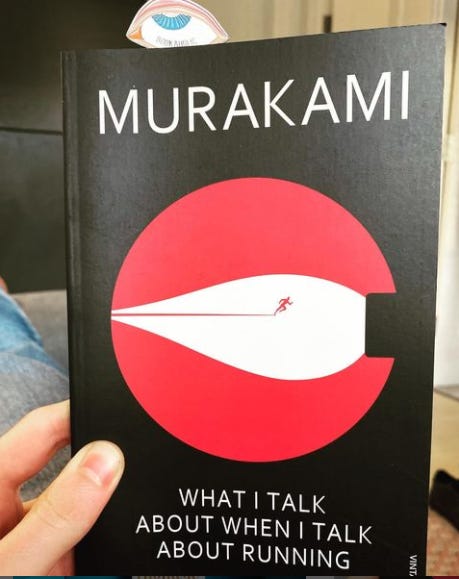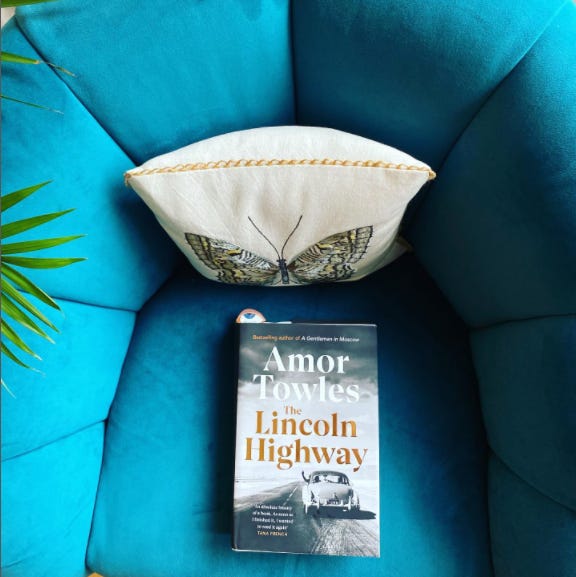Morning all!
A very warm welcome to my new readers, it’s a pleasure to have you here and I hope you enjoy what you read. To get you up to speed with the format, I publish two things:
A short story, or part of a serialised story, every other Wednesday
A monthly round-up of what I’ve been reading (this post)
If you want to go back and read some stories, click here. If you want to read last month’s round-up, click here.
Now, here’s everything I read in February.
Book Round-Up #02
What I Talk About When I Talk About Running by Haruki Murakami
What I Talk About When I Talk About Running is a short memoir by Murakami all centred - as you might guess - around the act of running. It’s spread over a couple of years and written in the present tense in the build-up to running the New York marathon.
At the time of writing in the mid-2000s, Murakami is approaching sixty, and so part of what he is grappling with in the memoir, which is really fascinating in the context of the New York marathon, is the physical decline that comes with age.
For context, Murakami - one of the most celebrated literary authors of our time, and the most famous living Japanese author - is a serial runner. Before being an author, he had his own Jazz club in Japan and then, one day, watching his local baseball team, he had an idea for a novel. Around the same time as writing his first novel, Murakami took up running. He found running and writing to be similar in many ways - the endurance required, the mental toughness, the meticulous training and the required personality traits. Since the early eighties, when he started running, he has run a marathon every year. Every. Year.
That’s almost unheard of.
At least with the people I know.
So in the book, Murakami reflects on some of the toughest runs he’s done - such as the time he ran from Athens to Marathon, the journey which gave the event its name, or the marathon around a lake in Northern Japan.
At the same time, he writes eloquently about the labour of love he has with running, how it helps him in his writing, and what it is he finds so obsessive about the sport - compared with other sports like squash, swimming or cycling.
To sum it up for you; Murakami writes:
"Most runners run not because they want to live longer, but because they want to live life to the fullest. If you're going to while away the years, it's far better to live them with clear goals and fully alive than in a fog, and I believe running helps you to do that. Exerting yourself to the fullest within your individual limits: that's the essence of running, and a metaphor for life — and for me, for writing as whole."
The Lincoln Highway by Amor Towles
I first came across Amor Towles, like many people, by reading A Gentleman In Moscow, the story of a cultured Russian gentleman, held hostage in a posh Moscow hotel by Stalin’s Soviet government. It’s hard not to fall in love with his writing: either because, as a writer, it makes you unfathomably jealous of his ability to write with both gravity and levity, to be both gripping but not complex, and to bring his characters to life; or because, as a reader, he has that masterful trait of delightfully remaining one step ahead of you, so you truly never know what is going to happen next.
While being a very different book, The Lincoln Highway, delivers the very same feelings.
This is the story - set in the 1950s - of Emmett, a teen boy who’s just been released from juvenile prison for accidentally killing a bully by knocking his lights out, his brother Billy and their friends Duchess, Woolly and Sally. The story takes its name from the first ever road to stretch the width of the United States, from Times Square all the way to the beach in California - where Emmett and Billy decide to journey in their old Studebaker motor to find a “fresh start”.
However, this particular road trip is thrown completely off course by the arrival of Duchess and Woolly - two friends of Emmett’s he really didn’t think he’d be seeing ever again.
Towles takes the reader on a ten day journey that is so genuinely unpredictable but also believable that you cannot help but keep turning the pages. And while it looks like a big, long read, it really isn’t. The chapters are punchy and gripping, some are just a couple pages long, and the writing is natural and believable, void of literary flourishes and vast descriptions. It’s alive from the first page to the last.
With that noted, the book still manages to convey a profoundness in the desire of the characters for their fresh starts, it has a real sense of compassion for the justice and injustice that brought the characters to their present predicaments, and it speaks to a particular time period where self-identity, discovery and a kind of rebelliousness against the old ways was bubbling around the psyche of millions of Americans - or at least was present in the popular literature of the time.
Before reading, I had a slight nervousness, a scepticism, that this book would live up to my love for A Gentleman In Moscow, but I have to say that it has matched it and is well worth a read.
Thank you very much for reading! As you can see I only managed two books in February, as I’ve been so busy, but it’s quite enjoyable to write about these books.
I hope you enjoyed this newsletter and I have included links to the goodreads pages for all the books, where you can find a place to buy them. I recommend, if you can, buying independently rather than through Amazon. In the UK, I use hive.co.uk to buy through independent booksellers.



